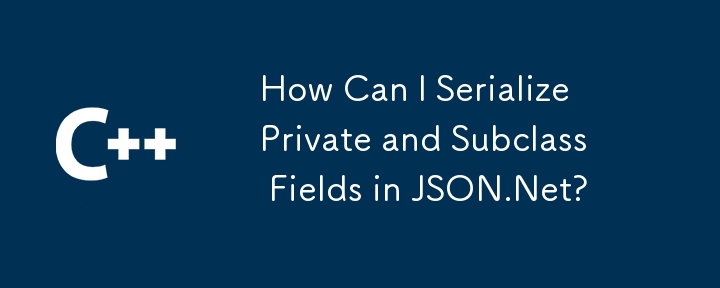

JSON.Net: Serializing Private and Inherited Fields
This guide demonstrates how to serialize complex objects using JSON.Net, including private fields and those inherited from subclasses. Serialization converts objects into a storable or transmittable format. For objects with private members or complex inheritance, JSON.Net requires custom handling.
The Challenge:
You have a class hierarchy with fields of varying accessibility (public, private, protected, etc.). You need to serialize all fields, even private ones and those in subclasses, for example, for data backup.
The Solution:
A custom contract resolver allows overriding JSON.Net's default serialization behavior. This resolver will force the inclusion of all fields, regardless of their access modifiers.
JSON.Net Implementation:
var settings = new JsonSerializerSettings { ContractResolver = new MyContractResolver() };
var json = JsonConvert.SerializeObject(myObject, settings);Custom Contract Resolver (MyContractResolver):
public class MyContractResolver : Newtonsoft.Json.Serialization.DefaultContractResolver
{
protected override IList<JsonProperty> CreateProperties(Type type, MemberSerialization memberSerialization)
{
var props = type.GetProperties(BindingFlags.Public | BindingFlags.NonPublic | BindingFlags.Instance)
.Select(p => base.CreateProperty(p, memberSerialization))
.Union(type.GetFields(BindingFlags.Public | BindingFlags.NonPublic | BindingFlags.Instance)
.Select(f => base.CreateProperty(f, memberSerialization)))
.ToList();
props.ForEach(p => { p.Writable = true; p.Readable = true; });
return props;
}
}This resolver examines all instance fields and properties (public and private) of the given type and its base classes. It then marks each property as both readable and writable, ensuring complete serialization. Note that using this approach to serialize private fields should be done cautiously, especially for security-sensitive data.
The above is the detailed content of How Can I Serialize Private and Subclass Fields in JSON.Net?. For more information, please follow other related articles on the PHP Chinese website!




